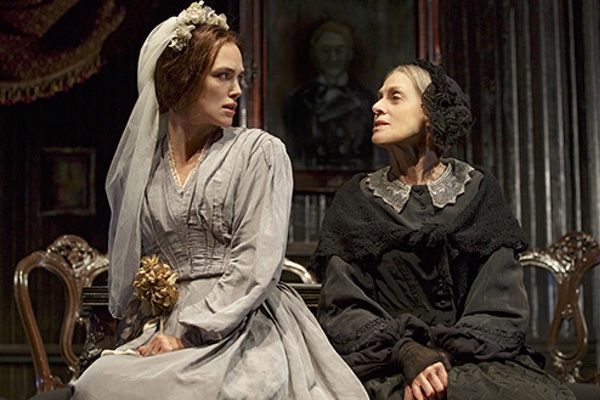Chilling Murder in 1867 Paris

Screen actress Keira Knightley, the star of such films as Pride and Prejudice, Anna Karenina, Atonement and The Imitation Game, made her Broadway debut in Therese Raquin last week at Studio 54, 254 W. 54th Street, in New York, She played a brooding, displaced young woman who married the wrong man and soon regretted it – and then tumbled down the dark rat hole into a murderous conspiracy with a lover in 1860s Paris.
The gorgeous Knightley is stunning when she steps on to the stage because here she is not stunning at all. She stars in the play without makeup, clad in dreary dresses and keeps her hair up most of the time. There is nothing glamourous or attractive about her, and yet she explodes on stage with thunderclaps of anger and lust and pulls you deep into the vortex of her life.
Therese Raquin, based on Emile’s Zola’s 1867 novel and adapted by Helen Edmundson, is set in the early days of Café Society in Paris. Therese, whose mother died when she was a child and father turned her over to a Parisian female relative, is working in the woman’s shop. She talks Therese into marrying her son, Camille, Therese’s first cousin. Camille is a sickly and rather dull young man with few interests and little ambition. She hates him, but feels that she owed it to the woman. Then the debonair Laurent arrives He is Camille’s friend and he falls head over heels in love with Therese, and she with him.
Therese Raquin is a taut, tight, highly entertaining and at times gripping murder story in which you learn much about crime and punishment in Paris in the 1860s, the life of the shopkeepers and their friends and Parisian fashion of the day. It is a nice jump back to the middle of the nineteenth century for history lovers. Knightley is a wonder as she seethes through the first act of the show and then encounters a multitude of emotional problems, one larger than the other, in the second. She is joined by Gabriel Ebert as Camille, Matt Ryan as Laurent, David Patrick Kelly as Superintendent Michaud, and the supremely gifted Judith Light as Mme. Rauqin. All are superb. Director Evan Cabnet does a fine job of working with the actors, to wind up with a fine show. The show has a haunting set by Beawulf Boritt that has its own huge park and pond in it.
The story has remained extremely popular since Zola wrote it. Therese has been turned in to several movies, a half dozen made-for-television films, three television series in England, Mexico and Italy and two operas.
One big problem: the first twenty minutes of the play are excruciatingly boring. Knightley is kept on the sides of the stages doing very little except moping, the plot unfolds ever so slowly and little happens. The show really erupts when Laurent gives Therese a lusty kiss whose heat would melt the Eiffel Tower. From there on, Therese is a roller coast of emotions and deep, tragic guilt.
Laurent and Therese must murder Camille to be together and they do so in a staged boating accident. They carry off the perfect murder; no one suspects them. And then they became caught up in a tangled web they wove, a web they cannot fight their way out of.
The pair never anticipated the emotions they would feel about Camille’s death and the play is as much a story of human emotion as it is murder.
The play is a good examination of mid-nineteenth century French life. Divorce in that era was practically unheard of, and so Laurent and Therese came to believe that they could only finalize their love through the murder. Wasn’t there any other way? No! shouts Laurent and Therese, head down on her chest, goes along with Laurent’s awful scheme.
It has so many contemporary themes that it could have been written on Thursday. Was Camille that dreadful? Therese that gorgeous? Laurent that handsome and daring? How hot does love get? And remain? The two lovers were, in the end, two people who insisted on getting everything in life, at their own price. How can you kill somebody and not realize how you are going to feel later? Worry that your partner in the homicide is going to turn you in, no matter what the century? That the ghost of the murdered won’t haunt you? Won’t someone see you? Overhear the story at some later date?
The police had just solved a murder when Camille was killed. They are not fools. Can you really dupe a citywide police investigation?
Historically, the play sheds nice light on Parisian history and the history of crime in that era. Crime in New York City was triple that in Paris in the 1860s, yet the crime rate in Paris and London had climbed considerably over the last fifty years. Paris had a rather new organized police force in the 1860s with its own detective squad. The rich in high society and the poor stumbled into crimes just as easily. Murders were becoming more frequent and the press coverage of them in Paris prominent. In the play, you learn much about the shops and the rich clientele they serviced as well as the loneliness of many in society.
Therese Raquin, although slow at first, is a must for lovers of history and of Law and Order, too.
PRODUCTION: The play is produced by the Roundabout Theatre Company. Sets: Beawulf Boritt, Costumes: Jane Greenwood, Lighting Keith Parham, Sound: Josh Schmidt. The play is directed by Evan Cabnet. It has an open ended run.